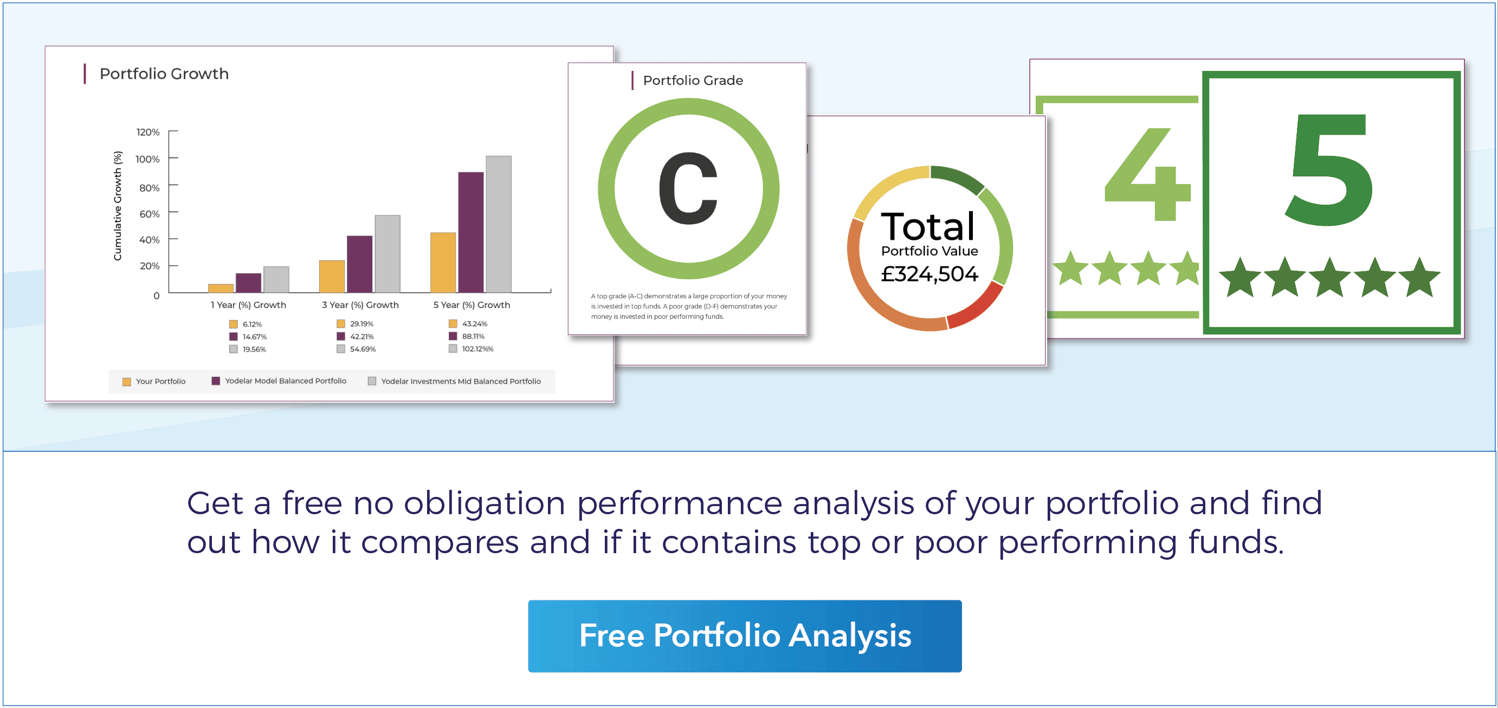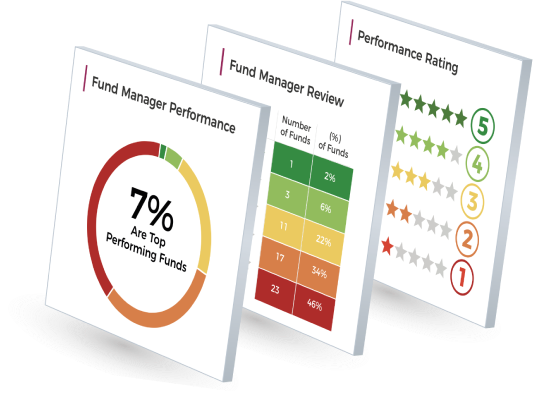- An analysis of almost 4,000 funds identified 340 that have consistently ranked in the bottom 25% of their sector for performance.
- The 10 worst funds in this report have been among the worst performing funds in their sectors over the past 1, 3 & 5 years
- The Baillie Gifford Japanese Smaller Companies funds was the worst performing fund in the IA Japan sector over the past 1 & 5 years.
- The once top performing Lindsell Train Global Equity fund has underperformed over the past 5 years ranking below 95% of funds in the IA Global sector for performance
Significant performance disparities exist between the best funds and the worst funds within the same sectors - yet many of the worst performing funds make it into the portfolios of UK investors, which can result in substantial missed portfolio growth.
Our analysis of nearly 4,000 sector-classified funds available to UK investors reveals a concerning trend. Examining performance over the past 1, 3, and 5 years, we found that 2,532 funds (63.5%) have consistently underperformed within their respective sectors.
The fund management industry includes numerous underperforming funds, some of which are surprisingly popular among investors who may be unaware of their relative underperformance.
This report highlights 10 of the market's poorest performing funds. Additionally, in the accompanying download, we provide details on 340 funds that have consistently ranked in the bottom quartile of their sectors for performance over the 1, 3, and 5 year periods.
10 Worst Performing Funds
The table below lists the 10 worst-performing funds along with key performance indicators, sector information, and ratings, giving a comprehensive overview of each fund over the most recent 1, 3, and 5 year periods. Each of these funds has a history of underperformance relative to their sector peers.

1. Baillie Gifford Japanese Smaller Companies
The Baillie Gifford Japanese Smaller Companies fund is classified within the IA Japan sector where it aims to surpass the MSCI Japan Small Cap Index by at least 1.5% annually over rolling 5-year periods. Its investment strategy focuses on smaller Japanese companies with significant business ties to Japan, including those listed, incorporated, or domiciled in the country.
Despite its objectives, this £167.64 million fund has demonstrated persistently poor performance within the IA Japan sector. In the past year, it registered a negative return of -16.01%, positioning it at the bottom of its 92-fund sector. The fund's 3-year performance further deteriorated, with losses of -43.38%, again placing it near the sector's lowest ranks. Over a 5-year horizon, the fund continued to underperform, declining by -30.33% and ranking last among 83 funds in its sector.
Several factors have contributed to the fund's underperformance, including its exposure to volatile sectors such as technology and industrials, broader economic challenges in Japan, and specific issues within its portfolio holdings.
2. Baillie Gifford Global Discovery
The Baillie Gifford Global Discovery fund marks the second Baillie Gifford fund featured within the 10 worst funds table. With a fund size of approximately £496.84 million, this fund has ranked among the worst performers in the IA Global sector. It aims to outperform the S&P Global Small Cap Index by at least 2% per annum over rolling five-year periods after costs.
Over the past 12 months, this fund has returned huge losses of -12.80% and over 3 years, it recorded a negative growth of -60.48%, ranking it last among 453 funds in the respective sector. Over the past 5 years, it returned negative growth of -28.33%, ranking 382nd out of 382 funds, well below the sector average of 16.85%.
The fund's poor performance is due to heavy investments in volatile sectors like healthcare and technology, significant declines in key holdings such as STAAR Surgical Co and Ocado Group PLC, and economic uncertainties impacting smaller companies.
3. T. Rowe Price Emerging Markets Equity
The T. Rowe Price Emerging Markets Equity fund aims to increase the value of its shares over the long term by investing in a diversified portfolio of approximately 90-120 stocks from emerging markets. The fund targets high-quality companies with long-term, sustainable above-market earnings growth, that are trading at prices not fully reflecting that growth.
Over the past year, this £227.84 million fund returned negative growth of -2.70% and has consistently ranked among the worst-performing funds in the IA Global Emerging Markets sector. It hasn’t just been the past 12 months that have been difficult for this fund. Over the past 3 & 5 years, this fund posted further losses of -27.48% and -11.33%, respectively, compared to the sector averages of -6.96% and 19%.
4. BNY Mellon Sustainable UK Opportunities
The BNY Mellon Sustainable UK Opportunities fund manages assets of £167.58 million and has underperformed significantly in the IA UK All Companies sector. This actively managed fund aims to achieve capital growth over the long term (5 years or more) by allocating at least 70% of its assets to a concentrated portfolio of UK equities and other equity-related securities that meet stringent ESG criteria.
Despite its sustainable focus, the fund's heavy concentration in volatile sectors has led to poor performance. The fund's strict ESG criteria limit its investment opportunities by excluding potentially high-performing investments and impacting overall returns.
Over the past 5 years, the fund has returned growth of 2.32%, significantly below the sector average of 25.28%. Over the recent 3 year period, it returned negative growth of -5.00%, which was again the worst in its entire sector.
5. Stewart Investors Worldwide Sustainability
The Stewart Investors Worldwide Sustainability fund aims to achieve long-term (at least five years) capital growth by investing in global equities, including both developed and emerging markets. It focuses on high-quality companies that demonstrate sustainable business practices, contributing positively to society and the environment.
With £434.06 million of clients' assets under management, this fund's strategy has led to underperformance and struggled in recent years. Over the past year, it returned growth of 4.26%, while the sector average was 17.22%. Over the past 3 years, this fund posted further losses of -0.72%, which was also the worst in its sector. The 5-year performance was also poor, with a return of 28.39%, well below the sector average of 56.22%.
6. Lazard US Equity Concentrated
The investment objective of the Lazard US Equity Concentrated fund is to achieve medium to long-term capital growth. It invests in 15-35 financially productive companies, typically with market capitalisations above $350 million. It is benchmark-agnostic, seeking to outperform the S&P 500 Net Total Return Index. The fund employs intensive fundamental analysis and accounting validation to identify high return on equity, free cash flow, and cash flow return on investment opportunities.
Despite its growth strategy, the fund has faced challenges and consistently underperformed compared to its peers in the North American sector. Over the last 5-year period, this fund has returned cumulative growth of 43.01%, which was well below the 80.68% sector average. The past 12 months have been a particularly challenging time for this fund, as it returned only 5.33% and ranked 229th out of 230 funds.
7. CT UK Mid 250
The CT UK Mid 250 fund is designed to increase the value of your investment over the long term. It seeks to outperform the FTSE 250 ex Investment Trusts Index over rolling 3 year periods, after the deduction of charges. The fund is actively managed and invests at least 90% of its assets in shares of companies listed on the London Stock Exchange, predominantly mid-sized UK companies.
This £56.03 million, CT UK Mid 250 fund has managed to return only 6.88% growth over the past year and is ranked among the worst in the UK All Companies sector.
As identified in our analysis, its performance over the past 3 & 5 years has been more disappointing, with negative growth returns of -21.19% and -1.04%, respectively, compared to the sector averages of 9.73% and 25.28%.
8. Quilter Investors Cirilium Moderate Portfolio
Despite being the largest fund with £1.52 billion, the Quilter Investors Cirilium Moderate Portfolio has consistently underperformed in IA Mixed Investment 40-85% Shares sector. The fund aims to achieve capital growth over five years or more by investing in diversified markets both in the UK and overseas.
The portfolio is broadly diversified across asset classes, with 40-80% allocated to equities and the remainder to fixed interest, property, commodities, cash, and currency. It maintains a volatility target of 9-13%, which is regularly reviewed and adjusted based on long-term actuarial assumptions.
Over the recent 3-year period, this 1-star rated fund has returned losses of -0.30%, which was one of the worst in its sector. Over the last 5 years, it delivered growth of 17.91%, again below the sector average of 28.08%.
9. Lindsell Train Global Equity
It may be a surprise to some, but one of the most popular and heavily invested in funds in the UK has consistently ranked among the worst performers in its sector.
Investor favourite, the Lindsell Train Global Equity fund, has struggled compared to its peers in the IA Global sector. Launched in 2011, the fund quickly rose up the rankings with strong performance prompting a clamour of interest from investors but over the past 5 years it has failed to match its early performance.
The fund currently manages £4.32 billion of client assets, yet over the past year it only managed to return growth of 10.46%, which was significantly lower than the 17.22% sector average in its sector. The 3 & 5 year performances were also poor, with growth returns of 4.83% and 21.10%, respectively, which was well below the 17.08% and 56.22%, ranking among the worst in its sector.
10. Liontrust Sustainable Future Cautious Managed
The Liontrust Sustainable Future Cautious Managed fund, situated within the IA Mixed Investments 40-85% shares sector, aims to deliver sustainable returns while adhering to environmental, social, and governance (ESG) principles. This fund's approach combines cautious investment strategies with a focus on companies that demonstrate strong sustainability practices.
However, the fund's performance has consistently lagged behind its sector average over the 1, 3 & 5 year period. While it delivered a positive return of 10.59% over the past year, this fell short of the sector's 13.11% average. More disappointing was its 3 and 5 year performances, with a loss of 4.88% and a gain of 17.69% respectively, both significantly underperforming the sector averages of 8.47% and 28.08%. This underperformance raises questions about the fund's ability to balance its sustainable investment approach with competitive returns, particularly in the medium to long term.
Sector Performance Summary
The table below shows the difference between the sector average for 9 popular investment sectors alongside the average returns of the worst performing funds over the past 1, 3, and 5 years. As featured in this report, the difference in performance can be significant.

Portfolio Growth Does Not Mean Good Performance
Fund performance, while crucial, is not a regulated aspect of financial planning. Consequently, many UK financial advisers, despite being regulated and compliant, may lack expertise in fund selection. This gap often results in investors holding underperforming funds, potentially limiting their portfolio's return potential.
Investors frequently misinterpret their portfolio's growth as satisfactory without considering the broader context. For instance, a 5% return might seem impressive at face value. However, market conditions can influence sector and fund performance, sometimes allowing even a portfolio of underperforming funds to generate seemingly attractive returns. The true measure of performance becomes apparent only when comparing a portfolio against one with a similar risk profile but consisting of consistently top-performing funds.
Claim your free portfolio analysis
Within each investment sector, certain funds consistently outperform their peers. These funds are typically managed by professionals who have demonstrated sector-specific expertise.
Recognising the difference between apparent growth and genuine outperformance is key for investors seeking to maximise their returns without unnecessarily increasing risk exposure.
Importance of Fund Performance
Evaluating fund performance is a crucial metric for investors and advisory firms. Although past performance does not guarantee future results, investors often favour fund managers who have demonstrated excellence over various time horizons.
Our worst funds report highlights the funds that have consistently underperformed the majority of their peers over the past 1, 3, and 5 years, with many demonstrating persistent underperformance over multiple periods.
3 important fund performance considerations:
Comparative Benchmarking
The performance of each fund can be assessed relative to competing peer group funds classified within the same sector. This comparative analysis across multiple time horizons provides insights into a fund’s overall quality and the capabilities of its management team.
Managerial Skill
Historical returns indicate a fund’s effectiveness and the competencies of its managers. Funds that consistently rank high within their sectors typically demonstrate a significant level of expertise. Conversely, fund managers overseeing consistently underperforming funds demonstrate a lack of quality and an inability to deliver competitive returns. While past performance alone cannot predict future returns, it remains a valuable tool for assessing manager skills.
Navigating Market Cycles
Over a multi-year span, investments encounter various economic and political environments. The ability of a fund and its managers to navigate these cycles offers valuable clues about their competence and abilities.
Evaluate Your Portfolio's Performance with a Free Portfolio Analysis
For years, Yodelar has analysed the performance and quality rating of portfolios for thousands of UK investors. Our extensive analysis has uncovered that over 90% of investors hold portfolios containing inefficiencies that stunt growth potential, resulting in many UK investors to miss out on enhanced portfolio growth.
Inefficient investing can have adverse long-term consequences, making it crucial to identify and correct any portfolio deficiencies.
Our industry leading portfolio analysis service enables investors to find out how their portfolio compares to a similar risk-profile portfolio constructed with top-performing funds. This unique tool provides measurable ratings that offer complete transparency into the quality of individual fund choices and the overall portfolio's competitiveness.
By utilising our portfolio review feature, investors gain detailed insights into the performance of their investments and can determine whether their current approach is optimally positioned for growth.
Key Benefits Include:
- Assess the performance of each fund
- See where each fund ranks within its sector over 1, 3, and 5 years
- Find out each fund's performance rating between 1 to 5 stars
- Identify the proportion allocated to top, mediocre, or underperforming funds
- Compare portfolio growth against model portfolios built with consistently top-performing funds
- Receive an overall portfolio performance grade from A to F



















